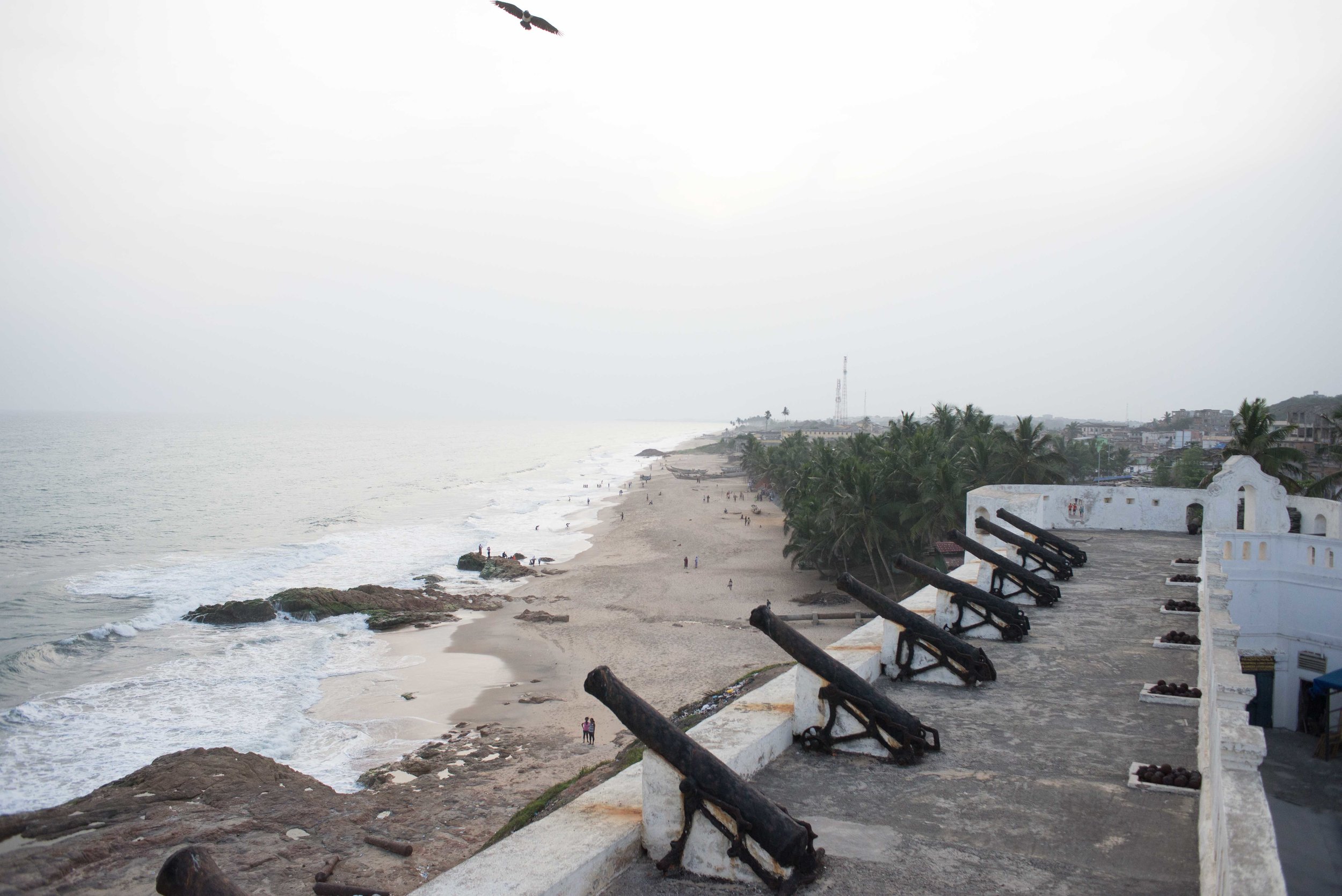Although they share a border, Ghana and Burkina Faso are worlds away. The capital cities of these two West African nations reflect this reality: Where Burkina is dusty and wanting, Accra is clean and plentiful, furnished with a KFC, several sushi restaurants and grass. Frequent neighborhoods like Osu and Labadi and you’ll forget entirely that you are on what Western world once called ‘dark continent.’ Tall, glittering buildings look out on an excitable coastline dotted with tourist-ready cabanas and fresh seafood. Find yourself in the right neighborhood and you’ll be able to peer into art galleries, organic teashops, high fashion boutiques and more. There is even a large mall where you can find everything from iPhones to traditional fabric that will blow your wallet in half. Wifi is becoming a pre-requisite in most establishments, and nothing but the ever-present traffic can slow Ghanaians down while driving on the capital’s perfectly paved roads and highways.
This is not to say that modernity is synonymous with Western comforts. Accra may have Starbucks, but you can’t fool yourself into thinking you’re living in the west. It has its very own, uniquely African heartbeat, and an economy that is solid enough to support a diverse array of both foreign and local businesses.
How did Burkina Faso get left so far behind?
To be entirely fair, my impressions of these two places are colored by the limitations I had in Burkina as a Peace Corps volunteer. My time in Ghana wasn’t spent lurking around the cheapest neighborhoods I could find trying to score a meal that would fit my meager budget. With a little more money to burn and the support of some locals, my visit to Accra gave me the opportunity to witness a very difference slice of West African life.
Freshly caught crabs ready for sale in Jamestown, once a port where slaves were shipped to the New World.
My first host was a friend from my year at Swarthmore, let’s call him Jo, who lives about 40 minutes outside of Accra. When he picked me up in his car he gave me a big, American hug and grinned at me with a perfect set of teeth. I got to listen to him code switch throughout our drive from Pidgin to Twi to the slightly British-sounding English he had learned to get by with at Swarthmore. As we drove he told me about his life in Ghana, and I learned to my amazement that Jo had his hand in many different honey pots. Whether it is facilitating the sales of warehouses, managing his Ghana-US business, starting a school for girls or planning for two art shows at a time, Jo’s schedule is painfully full every day. Meeting his friends, some of them transplants and some of them natives, all of which attended a prestigious 4-year college in the US, I saw that Jo was not unique. These young men, living in spacious apartments with hardly any furniture and 24-inch flat screen TV’s, are carving their way into Ghana’s economy.
And what an economy it is. My impression is that Ghana strikes a balance between the business efficiency of the United States and all of the advantages of the informal economies so prevalent in West Africa. This beautiful fusion results in a fertile space for ambitious young Ghanaians (and foreigners) to plant themselves in lucrative positions and reinforce the liveliness of an economy on the brink of a boom. They are looking to build solar power plants, hospitals, take over oil companies, connect US businesses with Ghanaian ones and much more. They are all under 30.
“Some Ghanaians are looking for steady jobs that pay,” Jo tells me on the way to meet with a gallery owner, “we are looking to close deals.” Later, sitting cross-legged on a clean tiled floor in an apartment that must be bigger than my family’s in New York, I’m wondering how I missed enrollment day on the ‘how to be successful’ class at Swarthmore.
Ghana has always been a place of interest when it comes to business. Today it’s warehouses and fabrics but 300 years ago, when Ghana was still the Gold Coast, its business was slaves. Unlike the United States, Ghana has made no effort to forget this period in its history that saw some of the most extreme human cruelty imaginable. The coastline is dotted with the well-maintained relics of the slave trade, castles, forts and ports that were used to ship human beings to the new world after being kept in dark rooms for 3 months, shoulder to shoulder, wallowing in excrement several feet high. I’m pleased to say that Africans and foreigners alike visit these slave relics and follow well-educated and passionate guides as they describe what took place in each room: how men were chained together and made to fight for the scraps of food that were dropped on their heads once a day, or how women that resisted being raped were kept in tiny dark cells until they were too weak to put up a fight. At one fort there was a church siting atop a cell that held 200 men for three months, a man-made heaven and hell. In the fort at Busua there was a British farmer living in what used to be the women’s cell.
“I come here about once a year,” he told our small group in a jolly tone, “I’m trying to turn this place into a guest house.”
“A guest house?” I asked in a barely metered tone.
“I just want people to be able to come and enjoy it,” he said grinning. My lip curled. The branding equipment that had been used to mark the slaves at this particular fort had been removed a few years back when this farmer had decided to make the place his summer home. Mustn’t scare the guests.
Neo colonialism notwithstanding, it seems that Ghana continues to be West Africa’s golden child. With gold, a coast line, respectable infrastructure and now oil, Ghana looks like it’s set up for rapid growth in the coming decades. At least, that’s my professional opinion. If young Ghanaians like Jo and his friends can find space to flourish in their home country, Ghana will not suffer from the brain drain that plague places like Burkina Faso. Maybe a little of that good energy will cross the northern border.






